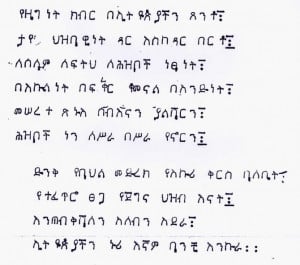


(Read full review in Anglo-Ethiopian Society Newsfile Spring 2021, here. As Daljit Nagra writes on the blurb, Beckett ‘works with two sharply distinctive traditions in a uniquely engaging way.’ He engages us because he is fully engaged himself in bringing two languages and cultures together in his poems. You get a real sense of the poet as translator, attempting to bridge gaps of time, culture, poetry, natural justice. Written in English, they reflect Ethiopian praise shouts, elegies, famine couplets, and the way language inevitably mirrors people’s concerns, such as hodé (my stomach) being an Amharic term of endearment (Sweetheart). Hama Tuma: These poems bring 1960s Ethiopia vividly to life, both inside and beyond the gates of a white boy’s house, but the themes they evoke such as child hunger and inequality are also universal and pressing. Sasha Dugdale: These poems are utterly distinctive, there is something at once proud and sad in them, as the reader senses that Tenderfoot loves but stands outside what he loves.


 0 kommentar(er)
0 kommentar(er)
